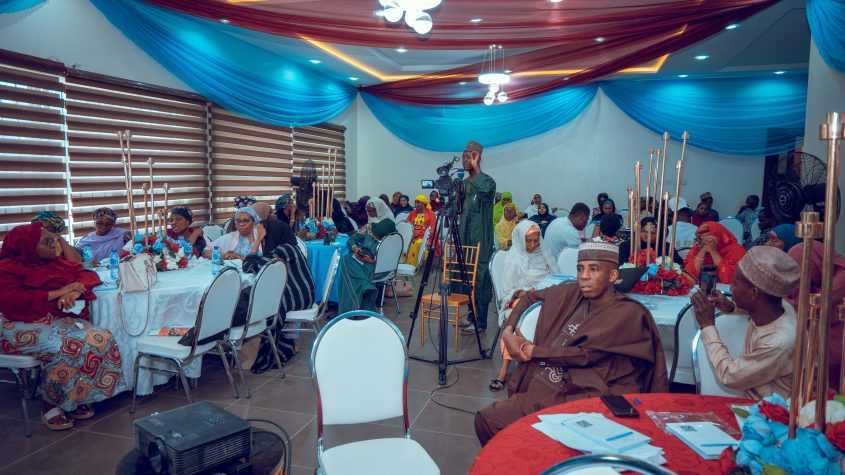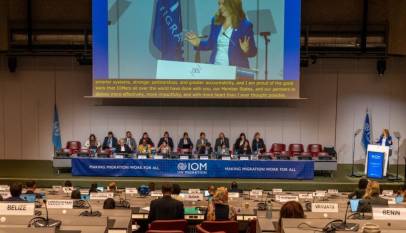NFNV-WLFI: Empowering Women Entrepreneurs through Digital Financial Inclusion
The New Faces, New Voices Nigeria’s (NFNV Nigeria)’s 2024 Kano Women Leadership and Financial Inclusion (WLFI) Summit brought together key stakeholders who discussed strategies for overcoming access to finance barriers and harnessing digital tools to empower women entrepreneurs.

New Faces New Voices (NFNV) is a pan-African women in finance network under the Graça Machel Trust (GMT) focused on empowering women to play an active role in Africa’s financial landscape. Themed: “Accelerating Women’s Financial Inclusion through the Digital Economy,” the Summit brought together key stakeholders including finance experts, policymakers and women entrepreneurs who discussed strategies for overcoming access to finance barriers and harnessing digital tools to empower women entrepreneurs.
Since 2022, NFNV-NIGERIA has been implementing the Women Leadership and Financial Inclusion (WLFI) project. In WLFI’s first year, NFNV-NIGERIA focused on laying the groundwork for the project through workshops and baseline research to understand the specific challenges faced by women in leadership and financial inclusion across various sectors. In year 2 of the WLFI project, NFNV-NIGERIA hosted workshops in Lagos and Kano expanded its reach and impact by launching targeted advocacy campaigns to influence policy changes that support women’s economic empowerment.
NFNV-NIGERIA partnered with financial institutions to develop inclusive financial products and services tailored for women entrepreneurs. It also strengthened its mentorship network, providing more personalized guidance and support to women entrepreneurs, thereby nurturing a more inclusive and supportive environment for their businesses. During the third WLFI project year, NFNV Nigeria is offering a series of capacity-building workshops aimed at equipping women with digital financial skills and consolidating the gains it has made under WLFI in the previous two years.
While elaborating on the impact of the WLFI project on women entrepreneurs, Dr Abdussalam Kani of the Fiscal Discipline and Development Advocacy Center (FIDAC), said WLFI connects women SMEs with mentors who enrich their businesses and professional experiences, enabling them to operate independently and craft their own proposals and work plans. This, he said, helps improve access to finance and financial services, which fosters financial inclusion and closes the gender-wealth gap.
“The WLFI project offers financing opportunities across formal and informal sectors, aiding the start-up of and expansion of enterprises. Through WLFI, women entrepreneurs gain skills in managing funds, developing business ideas, creating business plans, and establishing fruitful banking relationships. Unique WLFI activities include mentorship, networking sessions, capacity development, and leadership webinars,” Dr Kani enumerated.
In her welcome remarks at the Summit, Aishatu Debola Aminu, NFNV Nigeria Country Director, reflected on WLFI project’s accomplishments over the past 3 years, underlining the fact that NFNV-NIGERIA had, through its WLFI project, spearheaded numerous initiatives aimed at boosting social and economic impacts for women entrepreneurs. She therefore noted that the Summit was aimed at meaningful dialogue and exchange of ideas on how women entrepreneurs can leverage digital technology for growth.
“We are also committed to helping women entrepreneurs in the areas of access to digital markets, payments, and financing in order to support women-owned businesses in their expansion endeavors, explore the opportunities presented by the inclusive financial growth for women entrepreneurs. We will collaboratively propose strategies for streamlining the ease of doing business in the digital economy, ensuring a conducive environment for women’s economic participation,” the NFNV-NIGERIA Country Director noted.
Aminu stated that beyond the Kano summit, NFNV-NIGERIA would remain steadfast in consolidating the gains and lessons learned from its previous engagements on women’s digital and financial inclusion, highlighting the emergence of the digital realm as a powerful enabler of women’s economic empowerment in the post-COVID-19 economy. She said the rise of digital entrepreneurship among women in the aftermath of the pandemic offers a significant opportunity for advancing financial inclusion.
The NFNV-NIGERIA chief, however, underlined the persistent digital divide hindering many women from accessing and benefiting from digital advancements, asserting the urgent need to address issues such as affordability, access to education, and socio-cultural barriers that serve as obstacles to equitable access to digital technology for business structuring, management, and visibility which enhance productivity and profitability of business enterprises.
While delivering her goodwill message, Aisha Lawan, the Honourable Commissioner for the Ministry of Women, Children, and Disabled in Kano State, commended NFNV-NIGERIA for its dedication to creating more opportunities for women to thrive in the financial world, emphasizing the necessity of a collective effort to break down the sociocultural barriers hindering women’s access to finance and leadership opportunities which is crucial for building an equitable society,
“The current administration is committed to empowering women in Kano by empowering 5,200 beneficiaries every month. Each beneficiary will be given NGN50,000. The scheme commenced this month [May 2024]. And we are confident this development would go a long way in promoting financial inclusion in Kano, thereby breaking financial barriers across our rural and urban areas. This is indeed a milestone in our quest for achieving gender-sensitive financial inclusion,” she explained.
One of the summit speakers, Mr Adegboyega Adebajo, a business development consultant, spoke on the NFNV-NIGERIA Business Curriculum, focusing on the significant role of micro-enterprises as the dominant employment providers in particularly low-and middle-income countries. He urged microentrepreneurs to leverage digital technology to transform their businesses by replacing manual processes with digital solutions and periodically replacing outdated technologies.
Mr Adebajo therefore said supporting microentrepreneurs to adopt digital solutions was vital for advancing inclusive digital finance, noting that the digital economy fosters innovation and economic growth. He also described financial management as essential for a microbusiness’ health, stability and growth, by enabling informed decision-making, cost control, and risk management while ensuring that the business complies with financial regulations.
“Effective financial management contributes to a business’s overall success and long-term sustainability. Financial statements are crucial for assessing a company’s financial performance, stability, and profitability. They are also used for making investment decisions, evaluating creditworthiness, assessing risk, and complying with regulatory reporting requirements. These statements provide transparency and help stakeholders make informed decisions about a company’s financial health and prospects,” he noted.
While speaking on the role of social media in promoting e-commerce among women-owned MSMEs, Ruqayyah Muhammad of the Network for Awareness on Socio-economic Rights and Sustainable Development (NASSDev), said thanks to their billions of users, social media platforms have become powerful avenues for businesses to market and sell their products online. She said although women-owned MSMEs often face hurdles such as access to financing and cultural barriers, social media have now opened unrivalled opportunities for them.
“Social media platforms have evolved into dynamic marketplaces, offering a fertile ground for businesses to connect with consumers. E-commerce, facilitated by social media, has emerged as a game-changer, enabling MSMEs to transcend geographical boundaries and reach a broader audience. Women entrepreneurs, leveraging the accessibility and user-friendly nature of social media platforms, have seized these opportunities to showcase their products and services, thereby fostering economic empowerment and inclusivity.”
Ms Muhammad said getting the most value out of social media requires a balance between the networks that your audience use against the most popular networks. “Set aside time to respond to user comments, questions, and reviews, post photos and videos to generate even higher engagement rates. Entrepreneurs need to boost or promote posts, to increase engagement, views, and conversions. Partnership with social media influencers to reach the target audience at a cost-effective rate is required to achieve enhanced results.”
One the highpoints of the pledges we got at WLFI project year 3 Summit in Kano was the offer of a one-year free subscription by the online marketplace Kasuwa24 to all the women entrepreneurs who attended the Summit to advertise and sell their products on their platform. Overall, the Kano summit highlighted the need to address the digital divide and create an inclusive environment for women to fully participate and benefit from digital advancements. Bridging the digital financial gap in northern Nigeria requires the collective efforts of stakeholders such as NFNV-NIGERIA, governments, financial institutions as demonstrated in the shared vision of a more inclusive financial future for Nigerian women.














